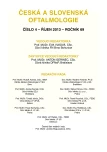Analysis of Reasons of Intraocular Lenses Explantation
Authors:
M. Veselá; D. Baráková; A. Lenčová
Authors‘ workplace:
Evropská oční klinika Lexum, Praha, lékařská ředitelka doc. MUDr. Zuzana Hlinomazová, Ph. D.
Published in:
Čes. a slov. Oftal., 69, 2013, No. 4, p. 170-173
Category:
Original Article
Prezentováno na kongresu ČSRKCH 2011 v Ostravě
Overview
Aim:
To analyze the reasons of intraocular lenses (IOL) explantation.
Methods:
Retrospective study of 22 eyes of 21 patients. Those patients underwent explantation of intraocular lenses between the years 2008 to 2011. The study group included two eye groups. Group A included eyes with exptanted monofocal IOL (14 eyes of 13 patients) and group B included eyes with explanted multifocal IOL (8 eyes of 7 patients). Reasons requiring explantation were analyzed based on subjective patient complaints and on objective ocular findings in health documentation as well.
Results:
The most common indications of explantation in Group A of monofocal lenses were incorrect IOL power, followed by IOL luxation, decentration and IOL opacity. In Group B of multifocal IOL, the most common reasons for IOL removing were halo and glare, inadequate postoperative expectations and incorrect IOL power.
Conclusion:
The main reason for IOL exchange in Group A of monofocal lenses was the incorrect power, while in Group B of multifocal IOL the main reason were the disturbing photic phenomenon like glare and halo. Careful patient selection, good surgical technique, optimally selected IOL power measurements based on precise biometry readings as well high quality of IOL materials are the most important factors in minimizing the risk for IOL explantation.
Key words:
cataract operation, explantation, intraocular lens
Sources
1. Alió JL, Plaza-Puche AB, PiĖero DP, Javaloy J, Ayala MJ.: J Cataract Refract Surg, 2011; 37 : 1605–14.
2. Auffarth GU, Wilcox M, Sims JCR, McCabe C, Wesendahl TA, Apple DJ.: Analysis of 100 explanted one-piece and three-piece silicone intraocular lenses. Ophthalmology, 1995; 102 : 1144–1150.
3. Connors R III, Boseman P III, Olson RJ.: Accuracy and reproducibility of biometry using partial coherence interferometry. J Cataract Refract Surg, 2002; 28 : 235–238.
4. Erie JC, Bandhauer MH, McLaren JW.: Analysis of postoperative glare and intraocular lens design. J Cataract Refract Surg, 2001; 27 : 614–621.
5. Farbowitz MA, Zabriskie NA, Crandall AS, Olson RJ, Miller KM.: Visual complaints associated with the AcrySof acrylic intraocular lens. J Cataract Refract Surg, 2000; 26 : 1339–1345.
6. Franchini A, Zamma Gallarati B, Vaccari E.: Computerized analysis of the effects of intraocular lens edge design on the quality of vision in pseudophakic patients. J Cataract Refract Surg, 2003; 29 : 342–347.
7. Holladay JT, Lang A, Portney V.: Analysis of edge glare phenomena in intraocular lens edge designs. J Cataract Refract Surg, 1999; 25 : 748–752.
8. Kuchynka, P.: Čočka in Kuchynka, P.: Oční lékařství, Grada Publishing, a.s. 2007, s. 372-426.
9. Leaming DV.: Practice styles and preferences of ASCRS members - 2003 survey. J Cataract Refract Surg, 2004; 30 : 892–900.
10. Mamalis N.: Complications of foldable intraocular lenses requiring explantation or secondary intervention - 1998 survey. J Cataract Refract Surg, 2000; 26 : 766–772.
11. Mamalis N, Spencer TS.: Complications of foldable intraocular lenses requiring explantation or secondary intervention - 2000 survey update. J Cataract Refract Surg, 2001; 27 : 1310–1317.
12. Mamalis N.: Complications of foldable intraocular lenses requiring explantation or secondary intervention - 2001 survey. J Cataract Refract Surg, 2002; 28 : 2193–2201.
13. Mamalis N, Davis B, Nilson CD, Hickman MS, LeBoyer RM.: Complications of foldable intraocular lenses requiring explantation or secondary intervention - 2003 survey update. J Cataract Refract Surg, 2004; 30 : 2209–2218.
14. Mamalis N, Brubaker J, Davis D, Espandar L, Werner L.: J Cataract Refract Surg, 2008; 34 : 1584–91.
15. McAlinden C, Moore JE.: J Cataract Refract Surg, 2011; 37 : 441–5.
16. Packer M, Fine IH, Hoffman RS, Coffman PG, Brown LK.: Immersion A-scan compared with partial coherence interferometry: outcomes analysis. J Cataract Refract Surg, 2002; 28 : 239–242.
17. Sinskey RM, Amin P, Stoppel JO.: J Cataract Refract Surg, 1993; 19 : 68–71.
18. Subramaniam S, Tuft SJ.: Early decentration of plate-haptic silicone intraocular lenses. J Cataract Refract Surg, 2001; 27 : 330–332.
19. Werner L.: Causes of intraocular lens opacification or discoloration. J Cataract Refract Surg, 2007; 33 : 713–726.
20. Whiteside SB, Apple DJ, Peng Q, et al.: Fixation elements on plate intraocular lens: large positioning holes to im - prove security of capsular fixation. Ophthalmology, 1998; 105 : 837–842.
Labels
OphthalmologyArticle was published in
Czech and Slovak Ophthalmology

2013 Issue 4
-
All articles in this issue
- Ocular Trauma in Childhood at the University Hospital Ostrava in the Years 2007–2011
- Anterior Uveitis Caused by Electrical Discharge in Whole Body Injuries (Fifteen Years Study)
- Anatomical Results of Cryosurgical Procedures in Rhegmatogenous Retinal Detachment – Our Experience
- Analysis of Reasons of Intraocular Lenses Explantation
- Contemporary Possibilities of Intraocular Pressure Measurement
- Czech and Slovak Ophthalmology
- Journal archive
- Current issue
- About the journal
Most read in this issue
- Contemporary Possibilities of Intraocular Pressure Measurement
- Analysis of Reasons of Intraocular Lenses Explantation
- Ocular Trauma in Childhood at the University Hospital Ostrava in the Years 2007–2011
- Anterior Uveitis Caused by Electrical Discharge in Whole Body Injuries (Fifteen Years Study)
